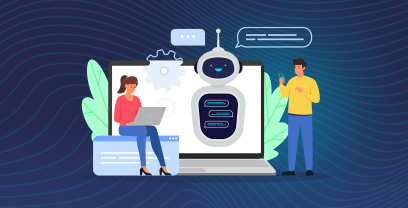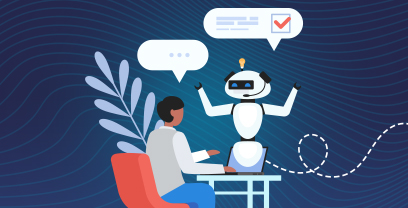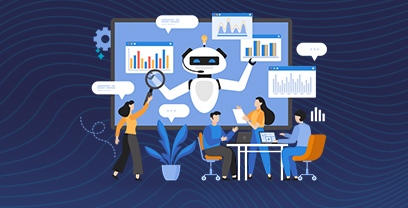In this type of environment, traditional procurement software and manual processes are insufficient – and many procurement teams are looking to artificial intelligence (AI) for answers.
We’ve seen AI take over everyday tools and search engines; AI in Sourcing and Procurement is becoming a strategic tool in our kit,
At Ivalua, we are helping global procurement teams integrate AI across the Source-to-Pay process, bringing automation, insight, and agility to every step. In this article, we explain how AI can transform sourcing and procurement processes and explore the radical benefits companies are already beginning to realize.
Key Takeaways
- Understand the potential impact of AI – including Generative AI & AI Agents – in procurement.
- Read about the various use cases for AI and Generative AI for procurement teams.
- Learn about Ivalua’s AI-powered virtual assistant and how it can help you save time, reduce risk and improve decision-making across the source-to-pay lifecycle.
Why Procurement Teams are Turning to AI
Procurement teams face growing pressure to deliver more value with fewer resources and fewer mistakes. Yet many still rely on manual processes that slow operations and increase the likelihood of costly errors.
Inefficiencies are baked into the procurement process, wasting time and budget while leaving the door open to errors such as missed deadlines or incorrect orders.
Supplier risk adds even more complexity. Without the right tools, it’s difficult to properly vet vendors or catch the early warning signs of potential fraud or other issues. Most teams are stuck reacting to problems after they’ve already escalated, rather than proactively managing risk.
Decision-making suffers, as well. With critical information spread across emails, spreadsheets, and outdated platforms, getting a clear, timely picture is virtually impossible. Choices are often made based on incomplete data or gut instinct – not data-driven insights.
This is where AI can make a huge difference. By automating routine tasks like onboarding a suppliers, kicking off a sourcing event, invoice matching, purchase order consolidation, and contract reviews, AI enables automated procurement workflows and reduces operational costs. Teams can shift their focus from administrative work to strategic initiatives and make faster, informed decisions backed by accurate data.
According to Gartner, the past year has seen a significant expansion in GenAI use cases, with vendors steadily introducing new capabilities across the sourcing and procurement space. Here are some of the ways AI can help solve typically pain points in procurement:
- AI can be used to analyze thousands of data points across financials, performance history, and even news mentions to flag potential risks early. That means better supplier choices and fewer surprises down the line.
- AI improves compliance and governance by ensuring policies are followed automatically and flagging problems before they get serious. This reduces regulatory risk and improves audit readiness.
- AI speeds up decision-making. With predictive analytics, procurement teams get real-time insights into spending patterns, market shifts, and supplier performance, so they can work faster and smarter.
In short, AI transforms procurement from a reactive, manual process into a proactive, data-driven function.
Real-world Applications of AI in Sourcing and Procurement
AI is driving real change across every stage of the source-to-pay process, from identifying the right suppliers to processing payments. Here’s how AI is being applied in key procurement functions:
AI-driven Sourcing Strategies
AI-powered tools analyze historical purchasing data, market trends, and supplier performance to recommend optimal sourcing strategies. They can identify cost-saving opportunities, highlight potential supplier risks, and even automate the initial stages of supplier discovery and RFP generation.
Contracting
AI shortens typically long contract review cycles by extracting key terms, flagging inconsistencies, and suggesting edits based on organizational policies. Natural language processing (NLP) tools can be used to compare new contracts to approved templates to ensure alignment, even helping with negotiation and redlining
AI-driven Supplier Management
AI can continuously monitor supplier performance, finances, and ESG compliance, or analyze external data sources such as news feeds or credit scores, and more to identify potential risks before they impact the supply chain.
Requisitioning and Ordering
AI streamlines purchasing by surfacing preferred suppliers and flagging non-compliant requests, reducing rogue spending and ensuring purchases align with negotiated contracts. Intelligent assistants can even recommend products based on past behavior or company policy.
Invoicing
AI helps accelerate invoice processing by automating the capture, matching, and validation of incoming invoices. It can spot discrepancies between POs, invoices, and receipts in real time, so teams can address and resolve issues before they delay payments.
Payments
AI enhances payment workflows by optimizing timing for early payment discounts and cash flow management. It can also detect anomalies that might indicate fraud or duplicate payments.
These procurement AI use cases demonstrate how AI is reshaping procurement and freeing teams from manual work while enabling smarter, data-driven procurement decisions.
Now that we understand how AI is being used in procurement, let’s examine the numerous benefits it delivers, especially in sourcing activities.
Key Benefits of AI in Procurement and Sourcing
An April 2025 study by Ardent Partners of nearly 400 procurement leaders found 62% believing the impact of AI on procurement in the next 2-3 years will be “Transformational” or “Significant.” This statement holds even more weight when you consider the remarkable advantages AI brings to procurement teams today:
- Cost Savings: AI helps reduce procurement costs by identifying spend inefficiencies, supporting dynamic pricing, and strengthening supplier negotiations. Smarter buying decisions and optimized sourcing lead directly to bottom-line savings.
- Risk Mitigation: With real-time monitoring and predictive analytics, AI helps teams identify supplier risks early and take proactive measures to avoid costly supply chain disruptions.
- Compliance and Governance: AI enforces procurement policies automatically, flags contract deviations, and detects suspicious transactions. This strengthens internal controls and reduces regulatory risk, while improving audit readiness.
- Speed and Efficiency: By automating repetitive tasks like purchase orders, invoice matching, and approvals, AI accelerates procurement workflows. Eliminating manual tasks helps to shorten cycle times and improve your team’s productivity.
- Supplier Relationship Management: AI supplier selection and performance tracking helps teams to build more transparent, trust-based relationships with vendors. Ongoing risk assessment and data-driven insights support collaboration and long-term value creation.
These advantages highlight the immense potential of AI in revolutionizing procurement and sourcing processes. However, unlocking these benefits begins with establishing a well-defined and strategic roadmap that aligns seamlessly with your specific procurement objectives.
Building a Roadmap for AI in Procurement
Implementing AI in procurement starts with understanding where it’s needed most.
Begin by identifying key pain points, such as inefficiencies, compliance gaps, or supplier risks. Then, map those challenges to areas where AI can deliver immediate value.
Next, select the right tools to match your needs. Popular solutions like AI-enhanced sourcing platforms, intelligent spend analysis tools, and procurement analytics software offer specialized capabilities that address different parts of the procurement process. Be sure to choose tools that integrate well with your existing tech stack, to avoid any operational disruptions.
Before deploying your new AI tools, ensure your data is AI-ready. Clean, structured, and centralized data is the foundation for any effective AI initiative, while poor data quality will undermine even the most advanced tools. So, invest time in preparing your datasets.
It’s a good idea to start small with pilot programs and test out your AI solutions in a controlled setting. Start with automating invoice matching or supplier risk scoring. This will help you validate AI’s impact and build internal support for a broader rollout.
Finally, train your procurement staff on the new tools and how they support various roles. Change management is just as critical as the technology itself for ensuring long-term success.
How to Choose the Right AI Procurement Software
Selecting the best AI procurement software is a critical step in modernizing your procurement function. The right solution should not only solve current challenges but also scale with your needs as your organization grows.
Here are the key factors to consider:
- Data Security and Compliance: Procurement systems handle sensitive supplier, contract, and financial data. Look for software with strong data security protocols, role-based access controls, and compliance certifications that align with your industry standards.
- Integration with Existing Systems: Seamless integrations with your ERP and other procurement platforms is essential. The software should easily connect to your existing infrastructure to avoid data silos and ensure end-to-end visibility across the procurement lifecycle.
- Scalability & AI Capabilities: Evaluate the software’s ability to grow with your organization. Look for Gen AI but also other advanced AI features like machine learning (ML), NLP, and process automation that can support a wide range of procurement functions, from sourcing and contract analysis to spend forecasting and supplier risk management.
- Vendor Support and Implementation Simplicity: A powerful tool is only effective if it’s implemented and adopted successfully. Assess the vendor’s support structure, onboarding resources, and the complexity of deploying the software. A solution that offers guided implementation and post-launch support can make a big difference.
With a clear understanding of what to look for in AI procurement software, the next step is choosing a platform that can meet those needs. Ivalua offers a comprehensive solution designed to support AI-driven procurement across the entire source-to-pay process.
Why Choose Ivalua for AI-Powered Procurement
Ivalua’s AI-enabled procurement platform is designed to help organizations improve data visibility, automate routine tasks, and make more informed decisions across sourcing, contracting, supplier management, invoicing, and payments. A key feature that enables these benefits and enhances useability and adoption is Ivalua’s Intelligent Virtual Assistant (IVA).
IVA supports procurement teams by identifying potential risks, streamlining tasks, and offering data-driven suggestions based on both historical and real-time information. This allows you to work more efficiently and respond to issues proactively.
In addition to its innovative use of agentic AI, Ivalua’s AI-powered procurement platform has many other distinguishing features:
- AI procurement automation across sourcing, contracting, and purchasing workflows
- Integration capabilities with major ERP and procurement systems
- Built-in AI tools for risk monitoring, spend analysis, and decision support
- Strong data governance and compliance controls
- Experience with complex, large-scale deployments
- Ongoing support and flexible implementation options
These features make Ivalua a strategic choice for organizations looking to improve procurement performance with AI, whether for targeted improvements or broader digital transformation.
Generative AI Use Cases: How Ivalua’s IVA Enhances Procurement Operations
Generative AI is reshaping how procurement teams work, and Ivalua’s Gen AI capability “IVA” is embedded across the platform. Currently, IVA supports over 25 use cases across supplier management, sourcing, contract management and Procure-to-Pay.
Enhanced Communications
IVA acts as a mass communication assistant for supplier interactions, generating outreach messages based on simple instructions and eliminating the need to start from a blank page every time. IVA supports category intelligence by compiling research-driven reports. These reports evaluate market impact, assess category-specific risks, and suggest recommended actions.
Legal Assistant
On the contracting side, IVA can instantly summarize complex documents and contracts, highlight key obligations, and even translate the content into different languages. It can generate or expand contract clauses to reflect specific terms or legal language, as well. IVA also simplifies follow-up actions to help improve supplier performance. For example, it can review an assessment and automatically generate an improvement plan with detailed KPIs and tracking metrics.
Chat With Your Documents
Last but not least, IVA’s ability to “chat with your documents” enables you to ask questions about a contract, policy, or supplier file and receive immediate, context-aware answers. It can extract key data, provide summaries, or surface relevant information on demand.
Together, these generative AI capabilities don’t just save you time, they help you move faster and be more accurate with automation and intelligence.
Learn more about Ivalua’s Intelligent Virtual Assistant powered by Generative AI.
Elevate Procurement with the Power of AI
AI is rapidly changing the face of procurement by automating routine tasks, improving decision-making, and reducing risk across the Source-to-Pay process. And, as agentic AI tools like Ivalua’s IVA demonstrate, it’s not just about efficiency; AI-powered tools help procurement teams work smarter – not harder.
However, while automation brings speed and scale, human expertise remains essential. The most effective strategies balance AI-driven insights with strategic judgment, as well as strong supplier relationships only possible when people manage them.
Now is the time to explore how AI-powered procurement software can elevate your operations. The future of procurement is here, so make sure your team is ready for it.
Did you know? Repeatedly recognized as a leader in the Gartner® Magic Quadrant™ and other analyst reports, Ivalua enables customers to achieve nearly 400% ROI through process automation, enhanced visibility, and the replacement of legacy systems, according to a recent Total Economic Impact™ (TEI) study conducted by Forrester Consulting. The study further found that Ivalua customers reported an average Net Present Value (NPV) of $25.5 million over three years.
Contact us to experience a demo of Ivalua IVA in action today!
Further Reading
Datasheet:
IVA (Intelligent Virtual Assistant)
Whitepapers:
Powering Procurement Transformation with Autonomous AI Agents
Generative AI in Procurement: A Practical Guide to Building Your Roadmap
Webinar:
Enabling AI-Powered Procurement: Exploring the Now and the Next
Blog:
Next-Level Procurement: Embracing GenAI and Building Resilience for the Future
The Arrival of AI Agents in Procurement – Understanding the Basics
Implementing AI Agents in Procurement: Best Practices & Strategies
Making the Case for Agentic AI in Procurement
FAQ
What is AI, and how does it apply to sourcing, procurement, and supplier management?
Artificial Intelligence (AI) refers to technologies that enable machines to mimic human intelligence, such as learning from data, recognizing patterns, and making decisions. In procurement, AI is used to automate repetitive tasks, analyze large volumes of data, flag supplier risks, improve sourcing strategies, and enhance decision-making.
How is generative AI different from traditional AI in procurement?
Traditional AI focuses on analyzing data and automating decisions based on patterns. Generative AI goes a step further – it can create new content (i.e. RFPs, contract summaries, supplier communications) based on a few user inputs. This makes it especially useful for speeding up content-heavy tasks in sourcing and supplier management.
Can AI fully replace human roles in procurement?
No, AI is not a replacement for human expertise; rather, it’s a tool to augment it. While AI handles routine tasks and data processing, humans are still essential for strategic thinking, relationship building, and complex decision-making.




